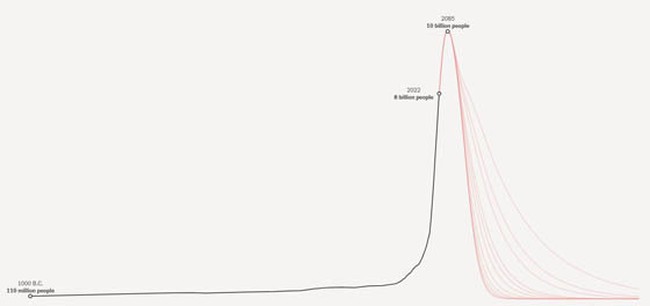If you were counting on a future in which the earth becomes so overcrowded that we are all forced to eat soylent green to stay alive, you can relax. That’s not going to happen. On the contrary, Dean Spears, an economist from the University of Texas, Austin, says people born today will likely witness the moment when the planet reaches peak humanity. Estimates vary but the moment when the human population stops growing and begins to drop off could by only 40 years away.
A baby born this year will be 60 in the 2080s, when demographers at the U.N. expect the size of humanity to peak. The Wittgenstein Center for Demography and Global Human Capital in Vienna places the peak in the 2070s. The Institute for Health Metrics and Evaluation at the University of Washington puts it in the 2060s. All of the predictions agree on one thing: We peak soon.
What’s expected to follow is a long uninterrupted decline that looks like this:

It’s hard to read at this size but the black line traces the human population from 1,000 BC to now where the global population is about 8 billion. That’s going to peak around 10 billion sometime in the next 50 years or so and then it just drops. As you can see from the various projections, the pace of that drop could be a few hundred years or a 1,000 but the idea is that once it starts we never level out again. As quickly as 300 years after that peak, we could be back to 2 billion people worldwide.
Most people now live in countries where two or fewer children are born for every two adults. If all people in the United States today lived through their reproductive years and had babies at an average pace, then it would add up to about 1.66 births per woman. In Europe, that number is 1.5; in East Asia, 1.2; in Latin America, 1.9. Any worldwide average of fewer than two children per two adults means our population shrinks and in the long run each new generation is smaller than the one before. If the world’s fertility rate were the same as in the United States today, then the global population would fall from a peak of around 10 billion to less than two billion about 300 years later, over perhaps 10 generations. And if family sizes remained small, we would continue declining…
Births won’t automatically rebound just because it would be convenient for advancing living standards or sharing the burden of care work or financing social insurance programs. We know that fertility rates can stay below replacement because they have. They’ve been below that level in Brazil and Chile for about 20 years; in Thailand for about 30 years; and in Canada, Germany and Japan for about 50.
In fact, in none of the countries where lifelong fertility rates have fallen well below two have they ever returned above it. Depopulation could continue, generation after generation, as long as people look around and decide that small families work best for them, some having no children, some having three or four and many having one or two.
The author points out that the root of this change is increasing standards of living. As people become more wealthy and more free, they are more likely to choose other things besides having a family or at least choose a smaller family. And the richer our descendants are the quicker the population is likely to drop.
So does this mean that concerns about climate change are pointless? The author says no because even if we peak in 50 years it could still take several generations before the population is significantly below where it is now. I get the impression the author doesn’t want to upset any apple carts but clearly if the global population drops to half of what it is now in 4-5 generations, that’s going to have a major impact on everything including how much carbon we’re burning.
In general the author’s concern seems to be with the politics of the future and how we can avoid things like anti-abortion politics in a future marked by steep population decline. This is frankly ridiculous. We may be able to predict in general when population will decline but I don’t think we have any idea what politics will look like 100 years from now, any more than someone in 1923 could have predicted the world as it is now. We’re about as likely to directly influence future politics as we are future economics. The reality is that everyone reading this will be gone and the concerns of future generations will be things we mostly couldn’t have predicted or imagined.








Join the conversation as a VIP Member